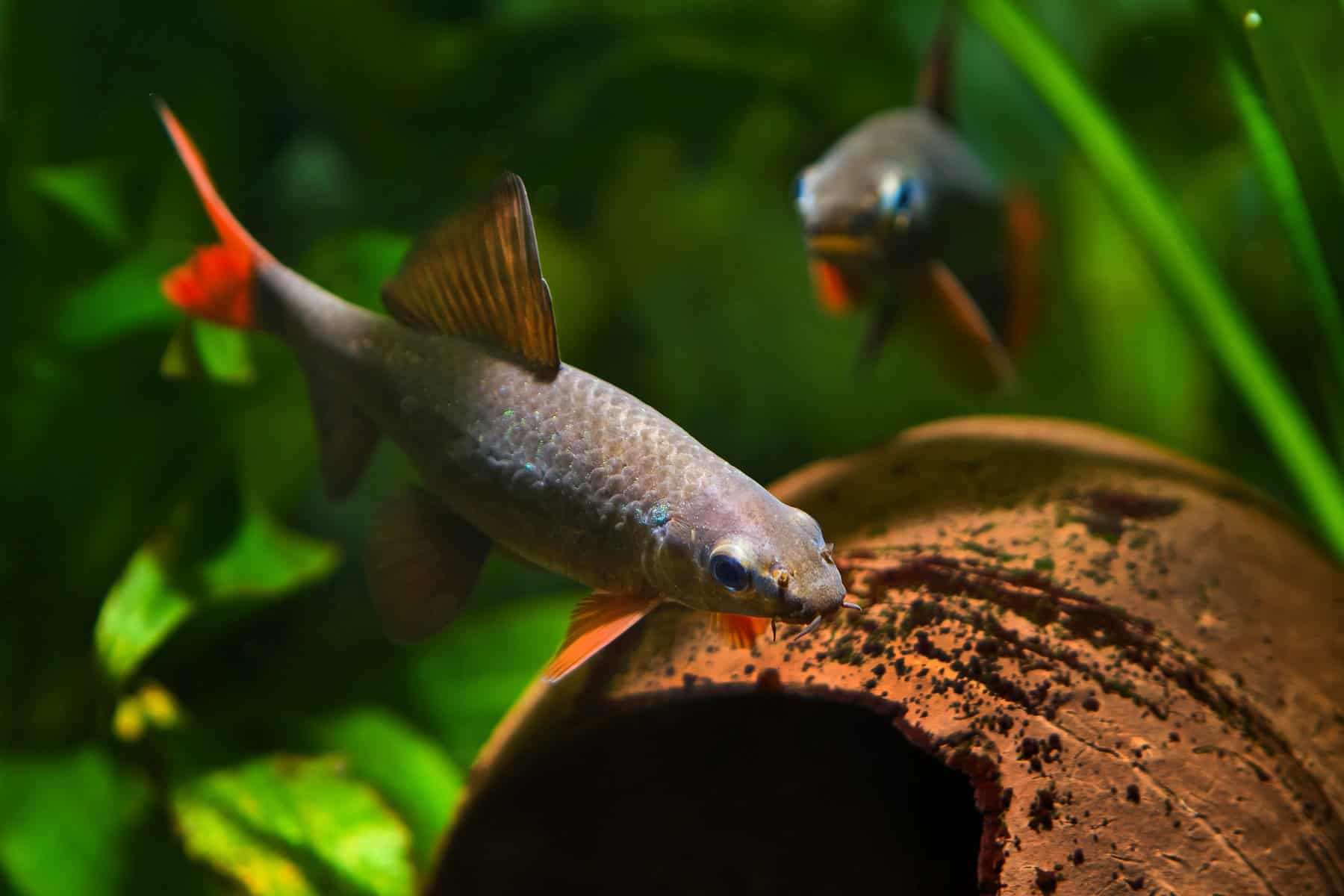If you thought that all animals can vomit, you’d be mistaken. While most vertebrates can throw up, rats can’t, and neither can horses. But what about fish?
The answer is that fish can vomit, but true vomiting is rare in fish and could be a sign of a dangerous disease.
What looks like throwing up in fish is more often simply spitting out food before it’s been digested.
Let’s take a look at the differences and the reasons why your fish might be throwing up or spitting out food.
Fish Spitting Out Food
Before we look at proper vomiting, let’s take a look at why fish sometimes chew up and spit out their food.
I’ve noticed this behavior, especially in cichlids, as I’ll explain here.
Overeating
Sometimes fish simply bite off more than they can chew!
In the competitive environment of a community tank or an aquarium with several tank mates, fish will use their instinct to eat as much as possible at feeding time to prevent other fish from eating their share.
I used to witness this with my pet kribensis, who was very dominant in my community tank. At feeding time he would rush around, chasing other fish and gulping down as much food as he could before the other fish could have a chance.
After a couple of minutes, he’d look rather regretful and start to spit out clouds of partially chewed-up food that he couldn’t swallow.
Luckily the Neon tetra and other small fish would quickly swarm around to hoover up the tiny particles and prevent them from going to waste!
If you suspect that competition for food is too high in your tank, you could try to feed your fish in different areas of the fish tank to prevent dominant fish from overeating.
A Second Round of Chewing!
Sometimes fish may spit out food when they’d prefer to have a second chance at chewing it up!
One of my favorite-ever pet fish, a gorgeous gold severum, used to do this with peas. She’d get very excited when I’d throw whole cooked peas in the water and eagerly chase them down.
But after swallowing them and chewing for a while, she’d spit the peas out into smaller pieces only to consume them again.
Perhaps chewing and swallowing an entire pea was a bit too much for her, but the smaller particles were easier to chew up and digest.
This kind of regurgitating partially chewed food is quite normal in many fish species and is nothing to worry about. But that isn’t the case when a fish vomits for real.
True Vomiting in Fish
While fish spitting out food that they’ve chewed is a perfectly normal and harmless behavior, throwing up digested food from the stomach may indicate a serious health condition in your fish.
In these rare cases, fish may throw up a juicy concoction of partly digested food and stomach fluids. As opposed to spitting out food, this soupy vomit doesn’t resemble chunks of food that they’ve just eaten, and the sick fish will rarely try to swallow them again.

Vomiting in fish can also be caused by internal infections such as Hexamita parasites, or bacterial infections. These conditions are very serious and can easily kill a fish if not treated in time.
Diagnosing Internal Infections
Unlike external infections, diagnosing internal infections can be difficult because the infected area is not visible.
Alongside a vomiting fish, symptoms may include bloat or dropsy, as well as the fish losing its orientation in the water, swimming sideways, or struggling to regulate buoyancy.
If you’re serious about helping your fish make a full recovery, your best option is to take your fish to a qualified fish vet to diagnose the disorder.
Treating Internal Infections
Hexamita parasites are normally treated with Metronidazole (Flagyl), either in the fish’s food or, if the fish isn’t eating, in a bath. With prompt treatment, fish will usually make a full recovery.
In the case of bacterial infections, the fish may also be showing signs of bloat or dropsy. Once again, the infection can be treated with an antibiotic, which may only be available with a veterinary prescription, depending on the local regulations where you live.
Preventing Internal Infections
Internal infections in fish are easier to prevent than to cure and are usually associated with poor water quality and an unsanitary tank environment.
You can help to prevent your fish from suffering from internal infections by vacuuming the tank regularly, making partial water changes at least every two weeks, and avoiding overfeeding.
A good aquarium filter will also work wonders at helping to keep your tank clean.
What About Sharks Throwing Up?
Although vomiting is rare in most fish species, sharks are famous for vomiting when they’re feeling stressed. This behavior is sometimes witnessed by fishermen who cause the shark a huge degree of stress when they’re hooked.
Yet sharks don’t just throw up their lunch – but their entire stomach organ! That’s right, their whole stomach comes out of their mouth to get emptied, and can be swallowed back down later.
Luckily, not many of you will be keeping sharks in your aquariums – and as you’ll probably know, freshwater fish like Red-tailed black sharks and Silver sharks aren’t really sharks at all, but are part of the carp family.
Conclusion
While spitting out food is a fairly common occurrence among aquarium fish, actual vomiting is an abnormal behavior and can indicate a serious health condition that needs addressing.
Internal infections can be difficult to diagnose, but with the help of a specialist vet, your fish could make a full recovery back to full health again.
To learn more about fish health and diseases, check out our articles on the subject here.


